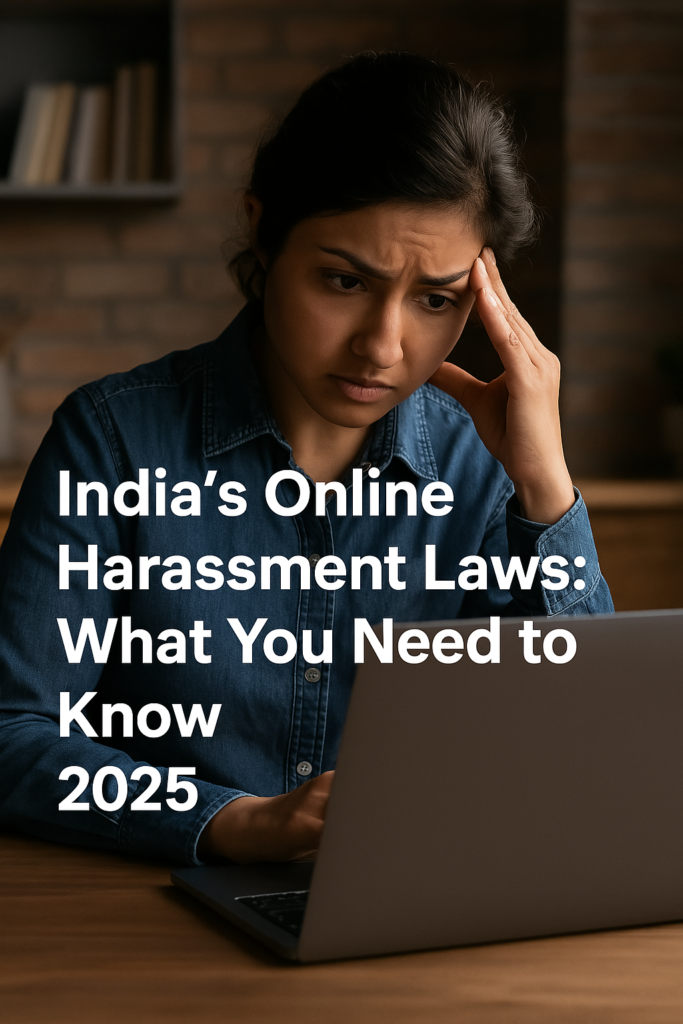India’s Online Harassment Laws: What You Need to Know 2025
Did you know that over 80% of women in India have faced online harassment? This shocking fact shows how urgent it is to have strong laws against online harassment. With more people using social media and digital tools, cyberbullying, stalking, and identity theft are big problems. It’s important to know your rights and the legal help available to keep you safe online.
In this article, we’ll look at India’s digital safety laws. We’ll see how they help fight online harassment. This will help you feel more confident when using the internet.

Key Takeaways
- Over 80% of women in India face online harassment.
- Understanding your legal rights is essential for digital safety.
- There are specific laws designed to combat cyberbullying and harassment.
- Victims must know how to report incidents effectively.
- Legal protections against online harassment are crucial for safety.
- Awareness of these laws empowers individuals to seek justice.
Understanding Online Harassment
Online harassment is when people use digital platforms to be mean to others. This can really hurt the feelings of those being targeted. It’s important to know how cyberbullying affects people to truly understand online harassment.
Those who face digital abuse might feel scared, anxious, or even worse. Their mental health can suffer because of it.
Definition of Online Harassment
Online harassment is when someone tries to scare, threaten, or harm others online. It’s not just about disagreeing. It’s about being mean on purpose, which can really upset the person being targeted.
Forms of Online Harassment
It’s key to know the different types of online harassment. This helps us spot the problem and know how to act. Here are some common ones:
- Cyberstalking: This is when someone keeps paying attention to you in a way that makes you feel scared or worried.
- Online Threats: These are messages or posts that say someone plans to hurt you.
- Sexual Harassment: This is when someone sends you unwanted sexual messages or pictures online.
- Doxxing: It’s when someone shares your private information without your okay.
- Abusive Language: This is when someone uses mean or hurtful words to make you feel bad about yourself.
These examples show how wide-ranging digital abuse can be. It’s crucial to understand cyber harassment to fight it better.
Relevant Indian Laws
India has a strong legal system to fight online harassment. Laws like the IT Act 2000 and IPC provisions protect victims. Knowing these laws helps you understand your rights better.
Information Technology Act, 2000
The IT Act 2000 is key in fighting cybercrime and harassment. It deals with privacy and inappropriate content. Important parts include:
- Section 66E – Protects your privacy from unauthorized access.
- Section 67 – Stops the sharing of obscene content without consent.
Indian Penal Code (IPC)
The IPC also has laws against harassment. Key sections are:
- Section 354A – Makes unwanted sexual advances a crime.
- Section 354D – Punishes stalking, including online stalking.
- Sections 499 and 500 – Protects against defamation that harms your reputation.
Protection of Children from Sexual Offences Act (POCSO) 2012
The POCSO Act protects children from online sexual abuse. It has strict penalties for offenders. This law aims to keep the internet safe for kids.

Knowing these laws helps you defend yourself online. The IT Act 2000, IPC, and POCSO Act give you the power to stand up for your rights.
Online Harassment Laws in India
In India, fighting cyberbullying is key. The Information Technology Act and the Indian Penal Code help a lot. They give rules to stop online harassment and protect victims. Here are the main points and laws to keep the internet safe.
Key Provisions Under the IT Act
The IT Act deals with online bad behavior. It makes sure people who do wrong are held accountable:
- Section 66E: Deals with privacy issues, like taking pictures without permission.
- Section 67: Makes it illegal to share obscene content online.
- Section 67A: Focuses on sharing sexually explicit content, with harsh penalties.
IPC Sections Addressing Cyberbullying
The IPC has laws against online harassment. They help victims get justice:
- Section 354D: Covers cyber stalking, with up to three years in jail for first-time offenders.
- Section 509: Protects against insults to modesty, with up to three years in jail.
These laws help protect victims of online harassment. Knowing them can help you fight back against cyberbullying.
Steps to Take If You’re a Victim
If you’re dealing with online harassment, knowing what to do is key. Quick action can greatly help. Here’s what you need to do:
How to File a Complaint
Reporting online harassment is a crucial step towards justice. In India, you can take the following actions:
- Contact your local Cyber Crime Cell. Many regions have online portals for filing complaints about online offenses.
- Consider filing a First Information Report (FIR) at your local police station. Give them all the details of the harassment to help with the investigation.
Gathering Evidence for Your Case
Gathering evidence is vital in harassment cases. Collecting enough proof can make your complaint stronger. Here’s how to gather evidence:
- Save every harassment instance by taking screenshots and saving messages or emails. This proof is key to backing up your claims.
- Keep a record of each incident’s date, time, and description. If you can, list any witnesses. Detailed records can help your case and may lead to legal action against the offender.
Legal Protections and Recourse
It’s important to know the legal protections for victims of online harassment in India. These steps help people report harassment and seek justice.
Reporting Mechanisms for Victims
Victims of online harassment have many ways to report it. You can go to local police stations or Cyber Crime Units. Many online platforms also have tools for reporting harassment.
Local NGOs and legal aid groups are also helpful. They offer support and help you understand how to report harassment in India. Their help can make a big difference.
Penalties for Offenders
Indian laws have tough penalties for online harassment offenders. The laws include jail time and fines. This shows how serious the government is about online harassment.
Those who keep harassing others face even harsher penalties. This is true, even more so if the victim is a minor. Knowing this helps victims stand up for their rights and fight against cyberbullying.
Conclusion
Knowing about India’s online harassment laws is key for anyone online. It helps you act if you’re a victim of abuse. Understanding your rights in India is a big step towards fighting this issue.
Remember, reporting harassment and seeking justice is crucial. It’s important to stand up against online abuse. When more people take action, the internet can become a safer place.
We need to call for legal action against online abuse. By fighting for these rights, we can make the internet a safer space for everyone.
FAQ
What constitutes online harassment under Indian law?
Online harassment is any hostile behavior on digital platforms that causes emotional distress. It includes cyberstalking, online threats, sexual harassment, doxxing, and abusive language.
What are the legal protections available for victims of online harassment in India?
Victims are protected by laws like the Information Technology Act, 2000, and the Indian Penal Code (IPC). These laws cover privacy violations, sexual harassment, stalking, and defamation. They help victims report and seek justice.
How can I file a complaint about online harassment?
To file a complaint, report it to your local Cyber Crime Cell or file a First Information Report (FIR) at your local police station. It’s important to gather evidence like screenshots and documentation of the harassment.
What penalties do offenders face for committing online harassment in India?
Offenders face severe penalties under the IT Act and the IPC. This can include up to three years in prison, fines, or more severe penalties for repeated offenses or cases involving minors under the POCSO Act.
Are there specific resources available to help victims of online harassment in India?
Yes, victims can find help from local NGOs, legal aid organizations, and online support groups. These resources provide guidance and support during the reporting and legal process.
What steps should I take immediately if I experience online harassment?
First, document all harassment incidents. Collect evidence like screenshots and messages. Then, report the harassment to the right authorities and seek legal advice to understand your rights and options.

